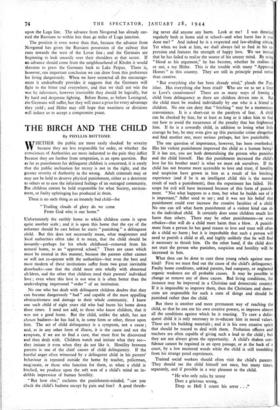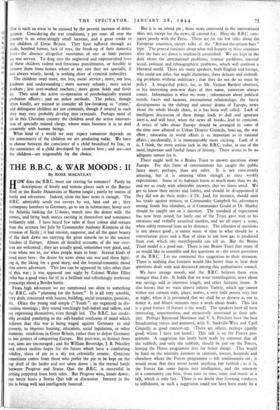THE BIRCH AND THE CHILD
By PHYLLIS BOTTOME
WHETHER the public are more easily shocked by severity because they are less responsible for order, or whether the consciences of Authorities are more indurated to the pain they inflict because they are further from temptation, is an open question. But as far as punishment for delinquent children is concerned, it is rarely that the public inclination for mercy is not in the right, and the greater severity of Authority in the wrong. Adult criminals may or may not be held to deserve physical punishment, either as a deterrent to others or to case the infuriated feelings of an outraged community. But children cannot be held responsible for what Society, environ- ment, or faulty upbringing has produced in them.
There is no such thing as an innately bad child—for "Trailing clouds of glory do we come From God who is our home."
Unfortunately the earthly home to which children come is upon quite another scale ; and it is upon this home that the eye of the reformer should be cast before he starts " punishing " a delinquent child.. But this does not necessarily mean, what magistrates and local authorities often take it to mean, that the child should be instantly—perhaps for his whole childhood—removed from his natural home, to an " approved school." There are cases which must be treated in this manner, because the parents either cannot or will not co-operate with the authorities—but even the best and most modern of these institutions suffer from two great inevitable drawbacks—one that the child must mix wholly with abnormal children, and the other that children need their parents' individual love ; even when this love is not wise it is often better than the undeveloping impersonal " order " of an institution.
No one who has dealt with delinquent children doubts that they can become dangerously " bad" and capable of the most appalling obstructiveness and damage to their whole community. I knew one such child of eight years old who had burnt his home down three times. I need not add, to those who know children, that it was not a good home. But the child, unlike the adult, has not chosen badness—be has had it, in some form or other, thrust upon him. The act of child delinquency is a symptom, not a cause ; and, as in any other form of illness, it is the cause and not the symptom, if we are to find a cure, that must first be discovered and then dealt with. Children watch and imitate what they see— they imitate it even when they do not like it. Hostility between parents is one of the chief causes of child delinquency. If the hurtful anger often witnessed by a delinquent child in his parents' behaviour is repeated outside the home by teacher, policeman, magistrate, or those who function for them, as when a child is birched, we produce upon the soft wax of a child's mind an in- delible impression of human hostility.
" But how else," exclaims the punishment-minded, " can you check the child's badness except by pain and fear? A good thrash- ing never did anyone any harm. Look at me! I was thrashed regularly both at home and at school—and what harm has it ever done me? " And indeed he is a respected and law-abiding citizen, Yet when we look at him, we shall always fail to find in his es. pression and features the strength of happy love. We see instead that he has failed to realise the source of his uneasy mind. By using " blood as his argument," he has become, whether he realises it or not, a toy Hitler. This is the trouble with many " Approved Homes " in this country. They are still in principle penal rather than creative.
" But everything else has been already tried," pleads the Pun- isher. Has everything else been tried? Who are we to set a limit to Love's creativeness? There are as many ways of freeing a child from delinquency as there are children driven into it. But the child must be studied individually by one who is a friend to children. No one can deny that " birching " may be a momentary convenience. It is a short-cut to the paralysis of fear. A child can be checked by fear, for at least as long as it takes hiin to find out how to avoid the recurrence of the penalty that has frightened him. If -he is a cowardly child, in addition to losing what little courage he has, he may even give up this particular crime altogether and find another one, more serious perhaps, but less punishable.
The one question of importance, however, has been overlooked. Has his violent punishment improved the child as a human being? If it has not, you are both demoralising the person who punishes and the child himself. Has this punishment increased the child's love for his brother man? is what we must ask ourselves. If the child has not become more accessible to love and trust, if hostility and suspicion have grown in him as a result of his birching experience (and if he is an intelligent child this is the normal result of such a 'punishment), then the experiment has failed. His scope for evil will have increased because of this form of punish- ment. " Not what happens to a man, but what he builds out of it is important," Adler used to say ; and it was not his belief that punishment could ever increase the creative faculties of a child. No one can tell what harm punishment of a violent kind can do to the individual child. It certainly does some children much less harm than others. There may be other puniihments—or even rebukes—that will do a child more harm than a blow. A punish- ment from a person he has good reason to love and trust will often do a child no harm ; but it is improbable that such a person will need to punish a child at all, and highly unlikely that he will find it necessary to thrash him. On the other hand; if the child does not trust the person who punishes, suspicion and .hostility will be increased in him.
What then can be done to cure these young rebels against man- kind? First we must find out the cause of the child's delinquency. Faulty home conditions, unkind parents, bad company, or neglected organic weakness are all probable causes. It may be possible to change or remove any of these causes. Bid living conditions, for instance may be improved in a Christian and democratia country. If it is impossible to improve them, then the Christians and demo- crats are responsible for such a state of things and should be punished rather than the child.
But there is another and more permanent way of reaching the child, so that he can use his own creative powers, to improve almost all the conditions against which he is reacting. To cure a delin- quent child it is only necessary to re-educate him in moral values. These are his building materials ; and it is his own creative spirit that should be roused to deal with them. Probation officers and teachers are often capable of giving such a lead to the child ; but they are not always given the opportunity. A child's shaken con- fidence cannot be regained in an open passage, or at the back of a court, by a few muttered words while the child is still trembling from his strange penal experiences.
Trained social workers should often visit the child's parents. They should see the child himself not once, but many times, separately, and if possible in a way pleasant to the child.
"He who only rules by terror Does a grievous wrong, Deep as Hell I count his error .
Nor is such an error to be excused by the present increase of delin- quency. Considering the war conditions, 3 per cent. all over the country is an astonishingly small increase, and a great credit to the children of Great Britain. They have suffered through air raids, bombed homes, lack of toys, the break-up of their domestic lives—the absence altogether sometimes of one or both parents on war service. To drag into the neglected and impoverished lives of these children violent and ferocious punishments, or forcibly to remove them from homes where at any rate they are specially, if not always wisely, loved, is nothing short of criminal imbecility.
The children need more, not less, social service ; more, not less, kindness and understanding ; more nursery schools ; more social workers • less over-worked teachers ; more green fields and fresh air. They need the active co-operation of psychologically trained probation officers ; and no police methods. The police, though often kindly, are trained to consider all law-breaking as " crime," and delinquent.children are not criminals, though if treated as such they may very probably develop into criminals. Perhaps most of all in this Christian country the children need the active interven- tion of specially trained clergy, whose main business it is to deal creatively with human beings.
What kind of a world we may expect tomorrow depends on the consciences of the children we are producing today. We have to choose between the conscience of a child brutalised by fear, or the conscience of a child developed by creative love ; and we—not the children—are responsible for the choice.



























 Previous page
Previous page